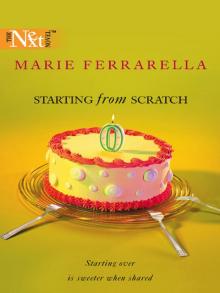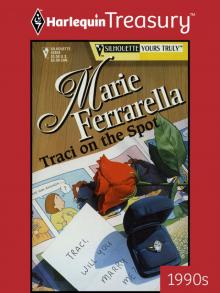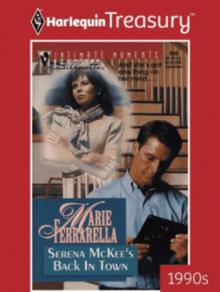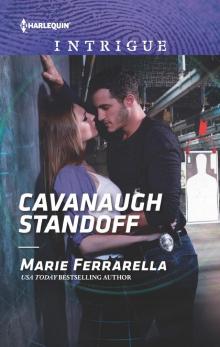- Home
- Marie Ferrarella
A Hero in Her Eyes Page 6
A Hero in Her Eyes Read online
Page 6
Tomorrow, she thought numbly. She looked around the shabby room. Very little of this was theirs. Still, it took time to put the things that did belong to them into the suitcases and boxes she would need. “Does it have to be tomorrow?”
“Yeah, it does,” he barked at her. “And you better hurry, woman.” He crossed to the front door. It was close to sunset, time a man started drinking. “Unless you want to pay the consequences.”
Without a word, she turned on her worn slippers and scurried into the bedroom.
The front door slammed, reverberating throughout the small apartment.
The room was emptied of adults.
The child in the corner drew herself up, making herself as small as she could be, afraid the man might come back and take his anger out on her. She shut her eyes tight.
Soon. Find me soon. Please, Daddy, find me soon.
Are you all right?”
Walker’s question came to her from a great distance. Eliza blinked, realizing that, in layman’s language, she had temporarily zoned out. It took effort to force back the chill she felt around her heart. “Yes, sorry.”
The woman had all but gone into a trance, Walker thought. He had to admit that it had been unsettling to watch her face suddenly lose all expression, as if some giant eraser had been passed over it.
“Was that for my benefit?”
Eliza tried to orient herself. It always took a moment after one of these episodes. Like a homecoming after a long trip, the last of which was undertaken blindfolded. Answering questions didn’t help the process. “Excuse me?”
He tried to put it into words, to make sense out of something that he vaguely felt might ultimately defy explanation.
“That distant stare you just had on your face. Like you were suddenly a million miles away. If you were a student in a classroom, I would have said you were daydreaming.” That was it, he told himself, just something she’d done just for effect. Still… “But you’re supposed to be a clairvoyant, so I thought that maybe…” His voice trailed off.
“I was giving you your money’s worth?” Eliza guessed at the unspoken part of his thought. Her smile was soft. Time had taught her tolerance. Far more tolerance than he was exhibiting. “Number one, I’m not ‘supposed to be a clairvoyant.’ Unfortunately, I am one. Number two, there is no need to ‘impress’ you since you are not a believer, but highly skeptical of me, and it would take far more than just a ‘daydreaming stare’ to change your mind. And three, I don’t need to pretend to do that—it happens enough on its own.”
And there were many times she wished she could turn these visions that burst upon her unannounced off and on like a spigot.
One thing she said caught Walker’s attention more than the rest. “Why ‘unfortunately’? You said you are a clairvoyant ‘unfortunately,”’ he repeated. “I’d think that if this kind of ability were actually possible, it would be a fortunate thing, not an unfortunate one.”
Did he really not believe she was what she said she was, or was he still challenging her to convince him? she wondered.
“Maybe I can put it into terms that make sense to you.” She thought for a second. “It’s like having a television set on twenty-four hours a day when you only have intermittent cable service. You just never know when something is going to come on or what it might be. I can’t ‘summon,’ I can’t ‘channel,’ I can’t choose. Usually, whatever I see ‘chooses’ me.” It was the best way she could describe the gift she had. It controlled her; she didn’t control it.
She was telling him not to get his hopes up, he thought. “So, being this thing—this clairvoyant—it doesn’t help you as an investigator at all.”
He was giving up before they began. She had her work cut out for her, Eliza thought.
“I didn’t say that. There are things I can do that sometimes help stimulate my ‘seeing’ something.” Pausing, Eliza looked into his eyes. There was no need to wish she could read minds; his thoughts were easy to read. “You’re not comfortable with any of this, are you?”
Walker laughed sharply, wondering himself a fool. “Not in the least.”
This was nothing new to her. But he had come seeking her out. More than that, he’d hired her and the agency she represented. Was he rescinding that now? “So why are you here?”
Because the desperate man he’d been two years ago was not dead, only hidden, and that man had surfaced again. “Because I can’t leave any stone unturned. Because if there’s a chance, the slightest chance, that you’re even remotely on the level, I have to try. To try to find Bonnie.” If she’s alive, he added silently. “I don’t have anything to lose.” He fixed her with a penetrating look—as if to divine the lie from her, if there was a lie. “You had to know about the toe shoes somehow.”
“Yes, I did,” Eliza agreed. “I saw Bonnie holding one. To be completely honest, I felt her holding it. Holding her hand over it while it was tucked behind the bib of her overalls and against her heart.”
He wasn’t going to let this get to him, he promised himself, even as he felt his eyes sting. “She always wore them.”
Eliza wasn’t sure if he was trying to point out a flaw in her story, or sharing information. “She was four when she was kidnapped. Now she’s six. Feet grow fast at that age.”
His heart was seized in a vise grip. How many never-to-be-regained milestones had he missed in his daughter’s life?
Looking away, he shoved his hands into his pockets. “Yeah. A lot of changes happen at that age.”
There was a sadness in his voice that threaded its way into her heart. She felt compelled to comfort him. “We’ll find her.”
He looked at her sharply, remembering another so-called “seer” saying the same words to his wife. When those words turned out to be empty and Rachel couldn’t take it anymore, she had killed herself.
“Don’t make promises you can’t keep, Ms. Eldridge.”
He was being formal again. Whatever line they’d crossed earlier had been re-crossed for some reason. But they weren’t back where they’d started, she was willing to bet money on that.
“I don’t,” she answered quietly. “Now, I need you to take me back to your house.”
He stiffened immediately. “Why?”
“I need to see her room, touch her things.” And he didn’t want her to, she thought, reading his expression. “That’s what I meant by saying that sometimes things help stimulate the process. Touching certain objects that were close to the person at times allows me to get a sense of what’s happening.”
His expression grew only more skeptical, even though he wanted to be convinced, wanted her to say something that would take him from his side of the fence and place him not on it, but squarely on her side of it. “But not always.”
“No.” This wouldn’t work unless she was being completely honest with him at all times. “Not always. We can only try and see—and hope.” She saw the look in his eyes, the hesitation in his bearing. “Is that a problem for you?”
“No, not a problem. But it might take a little while. Bonnie’s things are packed up and put away.” He didn’t owe the woman an explanation, but he heard himself giving one, anyway. “After—after my wife died, I couldn’t handle having all those reminders around.”
“So you packed them up and put them in the attic.” As she said it, in her mind’s eye, Eliza could see him doing it, climbing the stairs with box after box. Sealing his heart away.
He couldn’t read her expression or her tone, but he projected his own feelings. “I suppose you think that’s callous.”
Her smile was meant to put him at ease, with himself if not with her. “On the contrary, I think that’s very sensible. You did what you needed to do in order to survive. You were trying to move on with your life. That’s a positive action.”
He knew some who didn’t think so. His sister had been appalled that he could just put Bonnie’s things out of his life like that.
“What if she’s found?” Patrice had ask
ed. “How’s she going to feel, thinking that her father gave up and thought her dead?”
It was something he would handle when the time came. If the time came.
“Are you always this optimistic in your outlook?” he asked her.
She liked the glimmer of a smile she saw on his lips. If a person could smile, hope was not as alien a commodity as it was first thought to be. “Whenever possible.”
He didn’t understand eternal optimism. Especially if she was the clairvoyant she claimed to be. Didn’t seeing into the future mean seeing the dark side of what was to come? “Hasn’t anyone ever shot you down?”
If she only had a dime for each time, she thought. “They’ve tried, Walker. They’ve surely tried.”
“But never succeeded.” By her expression, he could see he was right.
She spread her hands wide, as if that were enough to drive the point home. “I’m still here.”
He didn’t know if that was a lucky thing or not. At least, as far as he was concerned.
Despite the fact that there was still several hours before evening, Walker switched on the light as they entered the attic. Precious little sunlight managed to work its way into the space.
The attic ran the length of the second floor. Most of it was empty. But there were stacks of boxes in two of the corners. Stacks of possessions. Stacks of memories.
He watched as dust motes swirled around, seeming to dance in the light. “It’s all dusty. I could have someone—”
But she held up her hand to stop him. There was no need to move anything for her benefit, and it would only bother him. “Dusty doesn’t matter. There’s dust everywhere.” She gestured vaguely, taking in the world at large. “It doesn’t bother me.”
This time when he laughed, there was humor in the tilt of his mouth. “Too bad my mother didn’t meet you before she died.”
Crossing to the stack farthest from the door, Eliza turned around to look at him. Her eyes met his.
A scene streaked through her mind, as clearly as if it were a small film clip from his life. A woman with a kindly face, on her knees, scrubbing a kitchen floor that didn’t need it.
Eliza could relate to that. “I clean when I’m restless or nervous, too.”
Walker’s mouth dropped open. That was a piece of information no amount of looking into and examining his life would have unearthed. To know Sylvia Banacek’s habits was to have known Sylvia. But his mother had passed on over ten years ago.
“How did you—?”
She gave him a simplified explanation. “I saw it in your eyes.”
If that was true… “You scare men away, don’t you?”
He’d struck a nerve, but it was one she’d learned how to deal with. “Sometimes.” She shrugged the admission away. “I try not to.”
That bothered her, he thought, having people shy away from her. For the first time, he began to think of her as a woman rather than as someone with a service to offer that might or might not be legitimate. “A man doesn’t like having his thoughts read.”
Tell me something I don’t know. She kept the reply to herself. Instead, she gave him fact. “I don’t do that in the traditional sense.”
Men in his experience didn’t split hairs. The very thought of a woman being able to actually see through them would send most of the ones he knew running for the hills. Was she lonely? he wondered, then told himself that had no bearing on anything. “But close enough to make an impression.”
“At times,” she allowed. “When I really make contact with someone.” The way she was right now, she added silently. Because, for a moment, when their eyes had met, their souls had, as well. That was why she’d seen into him as well as she had.
He rolled the words over in his mind. “That would be the ironic part, I suppose.”
“Yes, it would,” she allowed. It was time to back away from the personal and get back to why she was here. To discover something about the child who had reached out to her for help.
Drawn by instinct, Eliza made her way over to the corner of the attic where Bonnie’s things had been placed. Each one of the boxes had been brand new when packed, its contents clearly labeled on the side. The printing was Walker’s. She perceived the image of him standing on the side of the room, writing.
“You’re very neat,” she commented, looking from one box to another. “You get that from your mother.”
She was positively spooky. “Is that a question or a statement?” he asked.
“An assumption.” She smiled at him over her shoulder. “Based on previous information.”
He realized he was standing too close to her, and took a step back. It didn’t seem to help. Maybe it was being in the attic that was doing it. Hands in his pockets, Walker cleared his throat. “I can bring it all down for you if it makes it easier.”
Selecting a box, she tore away the tape from the top. It came off in one piece. “It wouldn’t make it easier on me, and it would make it harder on you.” The silence behind her told Eliza she needed to qualify her words. “Otherwise, you wouldn’t have brought her things up here to begin with.” He would have continued to coexist with them downstairs. Only having them boxed and put away made it possible for him to go ahead with his life.
He was still not saying anything. Eliza turned to look at him. “Why don’t you just leave me up here for a little while?”
He heard the kindness in her voice and it rankled him, though he knew it shouldn’t. But he’d never been able to take pity.
Walker forced himself to be reasonable. She was only trying to be nice.
“Seeing Bonnie’s things won’t bother me.” The denial came out far more tersely than he’d intended it to.
She didn’t have to be clairvoyant to know otherwise, but she saw no point in contradicting him. “But this might take me a while.”
That hadn’t occurred to him. He’d just assumed that she would get whatever vibrations—if that was how it was done—from the first object she touched. Still, to leave would be cowardly.
“I’ve delegated my responsibilities at work for today. There’s no place I have to be.” For the first time in a long time, he thought. It took hope for Bonnie’s recovery for him to finally take some time off. How strange was that? he wondered. While Bonnie had been a part of his life, much as he’d loved her, he’d always been too busy at the office to take any time off.
Eliza was losing time, and something made her feel that time was a very important element in all this. She just hadn’t worked out how. “Suit yourself.”
It wasn’t that she minded him watching her—even if his eyes did feel warmer, more penetrating than most of the eyes that had scrutinized her. She’d been observed before. Closely. It was just that she minded being observed if she came up with nothing. It was quite possible that touching Bonnie’s things might not give Eliza any insight, might not give her so much as a minuscule lead as to Bonnie’s whereabouts. The guilt associated with that would be tremendous.
There was no reason to feel that way, Eliza admonished herself. She wasn’t a preprogrammed robot. She was doing the best she could; no one else could ask more of her than that.
Wrong. She could ask more of herself than that. She did ask more of herself. She had always been more critical of her abilities and talents, and their absences at crucial moments, than anyone else.
Very carefully, she opened first one box, then another. The first contained toys, the second clothes. As Walker stood behind her, Eliza carefully laid them all out and then slowly handled each individually and at length. Hoping.
She could feel his eyes on her, watching every movement. At times, there wasn’t even the sound of his breathing—only hers. That, and the distant, rhythmic sound of life moving on somewhere beyond the house.
Eliza touched one thing after another with no success.
And then, out of the third box, she took a battered stuffed elephant. One ear was hanging by a tangled thread, clearly having been sewn on several times in the past,
and the trunk gave every indication that the misshapen pachyderm was well on its way to a badly needed rhinoplasty.
Holding the toy, she suddenly began to see. The wire mesh of the shopping cart, a pair of hands coming at her. Hands that were pulling her roughly out of the child’s seat, covering her mouth to keep her from crying out.
There was the smell of sickeningly sweet perfume. She was inside something. A car. Cracked plastic, discolored with grit and sweat, gray tufts of batting sticking haphazardly out of the seat she was thrown on.
“She’s come back, our baby’s come back. Drive, drive, drive!”
And then the swirls of light receded, melding with the dim interior of the attic. The images vanished, deserting her.
Eliza stared down at the stuffed animal in her hands, trying very hard to catch her breath. “Bonnie had this with her the day she was kidnapped, didn’t she?”
She could have read that in a newspaper account, Walker told himself. Still, his heart jumped at the sound of certainty in Eliza’s voice.
“Yes. It was her favorite.”
Eliza nodded. She knew that, could feel it the instant she touched the stuffed animal. “She still misses it,” she whispered, continuing to stare at the toy. “A woman took her. She called Bonnie her baby and told whoever was driving the car that their baby had come back.”
Suddenly, she felt Walker grab her roughly by the shoulders. The intensity she saw in his eyes stole her words from her.
“You had better be on the level,” he warned her, fighting to keep his emotions under control. “Whatever you tell me, you had better be on the level. I can’t go through this kind of thing again.”
She felt things then. Things she could identify and things that eluded her comprehension, but were nonetheless there, powerful. Overwhelming. His feelings became hers, and she understood every inch of the anguish-filled road Walker had traveled, only to find one dead end after another.
“I’d never lie to you,” she told him quietly.
Suddenly aware that he was holding on to her shoulders and that his grip had to be hurting her, he released Eliza. “I’m sorry.”

 Colton Baby Conspiracy (The Coltons 0f Mustang Valley Book 1)
Colton Baby Conspiracy (The Coltons 0f Mustang Valley Book 1) Cowboy's Rescue (Colton 911 Book 1)
Cowboy's Rescue (Colton 911 Book 1) Bridesmaid For Hire (Matchmaking Mamas Book 23)
Bridesmaid For Hire (Matchmaking Mamas Book 23) Secrets of Forever
Secrets of Forever Fortune's Greatest Risk (The Fortunes 0f Texas: Rambling Rose Book 4)
Fortune's Greatest Risk (The Fortunes 0f Texas: Rambling Rose Book 4) Cavanaugh Cowboy
Cavanaugh Cowboy Colton 911: Secret Defender
Colton 911: Secret Defender Cavanaugh Stakeout
Cavanaugh Stakeout The Late Bloomer's Road to Love
The Late Bloomer's Road to Love Colton 911--The Secret Network
Colton 911--The Secret Network An Unexpected Father
An Unexpected Father The Lawman's Romance Lesson (Forever, Tx. Series Book 20)
The Lawman's Romance Lesson (Forever, Tx. Series Book 20) Coming to a Crossroads
Coming to a Crossroads Colton 911: Cowboy's Rescue
Colton 911: Cowboy's Rescue Summer of Love
Summer of Love Cavanaugh Stakeout (Cavanaugh Justice Book 41)
Cavanaugh Stakeout (Cavanaugh Justice Book 41) Texan Seeks Fortune
Texan Seeks Fortune M.D. Most Wanted
M.D. Most Wanted Cavanaugh In Plain Sight (Cavanaugh Justice Book 42)
Cavanaugh In Plain Sight (Cavanaugh Justice Book 42) The Law and Ginny Marlow
The Law and Ginny Marlow Bridesmaid for Hire
Bridesmaid for Hire A Match for the Doctor
A Match for the Doctor The Sheriff’s Christmas Surprise
The Sheriff’s Christmas Surprise Colton's Secret Service
Colton's Secret Service A WEDDING FOR CHRISTMAS
A WEDDING FOR CHRISTMAS A Cavanaugh Christmas
A Cavanaugh Christmas Cavanaugh Fortune
Cavanaugh Fortune The 39-Year-Old Virgin
The 39-Year-Old Virgin Coming To A Crossroads (Matchmaking Mamas Book 24)
Coming To A Crossroads (Matchmaking Mamas Book 24) Cavanaugh's Missing Person
Cavanaugh's Missing Person Cavanaugh on Call
Cavanaugh on Call The M.D.'s Surprise Family
The M.D.'s Surprise Family Angus's Lost Lady
Angus's Lost Lady Her Red-Carpet Romance
Her Red-Carpet Romance Choices (A Woman's Life)
Choices (A Woman's Life) Prescription for Romance
Prescription for Romance A Perfectly Imperfect Match (Matchmaking Mamas)
A Perfectly Imperfect Match (Matchmaking Mamas)![[Kate's Boys 04] - Travis's Appeal Read online](http://i1.bookreadfree.com/i/03/21/kates_boys_04_-_traviss_appeal_preview.jpg) [Kate's Boys 04] - Travis's Appeal
[Kate's Boys 04] - Travis's Appeal Secret Agent Affair
Secret Agent Affair The Cowboy's Lesson in Love
The Cowboy's Lesson in Love Colton Copycat Killer
Colton Copycat Killer A Small Fortune
A Small Fortune Starting from Scratch
Starting from Scratch Her Forever Cowboy
Her Forever Cowboy Colton Showdown
Colton Showdown Crime and Passion
Crime and Passion The Heart of a Ruler
The Heart of a Ruler This Heart for Hire
This Heart for Hire A Forever Kind of Hero
A Forever Kind of Hero Special Agent's Perfect Cover
Special Agent's Perfect Cover The Baby Beneath the Mistletoe
The Baby Beneath the Mistletoe A Maverick and a Half
A Maverick and a Half The Doctor's Guardian
The Doctor's Guardian Cavanaugh Undercover
Cavanaugh Undercover Hero for Hire
Hero for Hire Fortune's Heirs: Reunion
Fortune's Heirs: Reunion How to Seduce a Cavanaugh
How to Seduce a Cavanaugh The Heiress’s 2-Week Affair
The Heiress’s 2-Week Affair Twice a Hero, Always Her Man
Twice a Hero, Always Her Man My Spy
My Spy An Engagement for Two
An Engagement for Two Traci On The Spot
Traci On The Spot Carrying His Secret
Carrying His Secret In Broad Daylight
In Broad Daylight Cavanaugh Cold Case
Cavanaugh Cold Case In Graywolf’s Hands
In Graywolf’s Hands The Baby Mission
The Baby Mission Real Vintage Maverick
Real Vintage Maverick Twins on the Doorstep
Twins on the Doorstep Cowboys Are For Loving
Cowboys Are For Loving Heart of a Hero
Heart of a Hero The Cowboy's Christmas Surprise
The Cowboy's Christmas Surprise Cavanaugh’s Woman
Cavanaugh’s Woman Sundays Are for Murder
Sundays Are for Murder Mission: Cavanaugh Baby
Mission: Cavanaugh Baby Cavanaugh Strong
Cavanaugh Strong Wish Upon a Matchmaker
Wish Upon a Matchmaker Dangerous Games
Dangerous Games What the Single Dad Wants...
What the Single Dad Wants... Rough Around the Edges
Rough Around the Edges Cavanaugh Judgment
Cavanaugh Judgment Cavanaugh Watch
Cavanaugh Watch Cavanaugh's Secret Delivery
Cavanaugh's Secret Delivery The Pregnant Colton Bride
The Pregnant Colton Bride Let's Get Mommy Married
Let's Get Mommy Married Searching for Cate
Searching for Cate A Forever Christmas
A Forever Christmas Dangerous Disguise
Dangerous Disguise Mac’s Bedside Manner
Mac’s Bedside Manner Cavanaugh Pride
Cavanaugh Pride The Fortune Most Likely To...
The Fortune Most Likely To... Internal Affair
Internal Affair A Second Chance for the Single Dad
A Second Chance for the Single Dad The Cavanaugh Code
The Cavanaugh Code Sapphire and Shadow (A Woman's Life)
Sapphire and Shadow (A Woman's Life) Her Lawman on Call
Her Lawman on Call A Dad At Last
A Dad At Last Her Right-Hand Cowboy (Forever, Tx Series Book 21)
Her Right-Hand Cowboy (Forever, Tx Series Book 21) Cavanaugh Heat
Cavanaugh Heat![[Ladera by the Sea 01] - A Wedding for Christmas Read online](http://i1.bookreadfree.com/i1/03/27/ladera_by_the_sea_01_-_a_wedding_for_christmas_preview.jpg) [Ladera by the Sea 01] - A Wedding for Christmas
[Ladera by the Sea 01] - A Wedding for Christmas Lassoing the Deputy
Lassoing the Deputy Serena Mckee's Back In Town
Serena Mckee's Back In Town A Baby on the Ranch: A Baby on the RanchRamona and the Renegade
A Baby on the Ranch: A Baby on the RanchRamona and the Renegade One Plus One Makes Marriage
One Plus One Makes Marriage Protecting His Witness
Protecting His Witness Cavanaugh Standoff
Cavanaugh Standoff The Baby Came C.O.D.
The Baby Came C.O.D. The Setup
The Setup Texas Rose
Texas Rose Three Marie Ferrarella Romances Box Set One
Three Marie Ferrarella Romances Box Set One The Lawman's Romance Lesson
The Lawman's Romance Lesson Desperately Seeking Twin...
Desperately Seeking Twin... Once a Father
Once a Father![[The Sons of Lily Moreau 02] - Taming the Playboy Read online](http://i1.bookreadfree.com/i/03/25/the_sons_of_lily_moreau_02_-_taming_the_playboy_preview.jpg) [The Sons of Lily Moreau 02] - Taming the Playboy
[The Sons of Lily Moreau 02] - Taming the Playboy Lily and the Lawman
Lily and the Lawman Cavanaugh's Surrender
Cavanaugh's Surrender The Cowboy and the Lady
The Cowboy and the Lady Innkeeper's Daughter
Innkeeper's Daughter A Bachelor and a Baby
A Bachelor and a Baby![[The Sons of Lily Moreau 03] - Capturing the Millionaire Read online](http://i1.bookreadfree.com/i1/03/31/the_sons_of_lily_moreau_03_-_capturing_the_millionaire_preview.jpg) [The Sons of Lily Moreau 03] - Capturing the Millionaire
[The Sons of Lily Moreau 03] - Capturing the Millionaire Because a Husband Is Forever
Because a Husband Is Forever Diamond in the Rough
Diamond in the Rough The Doctor's Forever Family
The Doctor's Forever Family A Lawman for Christmas
A Lawman for Christmas Cavanaugh Rules: Cavanaugh RulesCavanaugh Reunion
Cavanaugh Rules: Cavanaugh RulesCavanaugh Reunion Baby Times Two
Baby Times Two![[The Sons of Lily Moreau 01] - Remodeling the Bachelor Read online](http://i1.bookreadfree.com/i1/04/02/the_sons_of_lily_moreau_01_-_remodeling_the_bachelor_preview.jpg) [The Sons of Lily Moreau 01] - Remodeling the Bachelor
[The Sons of Lily Moreau 01] - Remodeling the Bachelor The Colton Ransom
The Colton Ransom Mendoza's Secret Fortune
Mendoza's Secret Fortune Hero in the Nick of Time
Hero in the Nick of Time![[Kate's Boys 03] - Mistletoe and Miracles Read online](http://i1.bookreadfree.com/i1/04/02/kates_boys_03_-_mistletoe_and_miracles_preview.jpg) [Kate's Boys 03] - Mistletoe and Miracles
[Kate's Boys 03] - Mistletoe and Miracles The Man Who Would Be Daddy
The Man Who Would Be Daddy Fortune's Second-Chance Cowboy
Fortune's Second-Chance Cowboy Coming Home for Christmas
Coming Home for Christmas Her Special Charm
Her Special Charm The Baby Wore a Badge
The Baby Wore a Badge Perfect Wyoming Complete Collection: Special Agent's Perfect Cover ; Rancher's Perfect Baby Rescue ; A Daughter's Perfect Secret ; Lawman's Perfect Surrender ; The Perfect Outsider ; Mercenary's Perfect Mission
Perfect Wyoming Complete Collection: Special Agent's Perfect Cover ; Rancher's Perfect Baby Rescue ; A Daughter's Perfect Secret ; Lawman's Perfect Surrender ; The Perfect Outsider ; Mercenary's Perfect Mission Montana Sheriff
Montana Sheriff Fiona And The Sexy Stranger
Fiona And The Sexy Stranger Military Man
Military Man Dating for Two (Matchmaking Mamas)
Dating for Two (Matchmaking Mamas) Cavanaugh Encounter
Cavanaugh Encounter In His Protective Custody
In His Protective Custody A Small Town Thanksgiving
A Small Town Thanksgiving Wanted: Husband, Will Train
Wanted: Husband, Will Train Suddenly...Marriage!
Suddenly...Marriage! Plain Jane and the Playboy
Plain Jane and the Playboy Private Justice
Private Justice The Strong Silent Type
The Strong Silent Type Christmas Cowboy Duet
Christmas Cowboy Duet Flash and Fire
Flash and Fire Colton by Marriage
Colton by Marriage Fortune's Valentine Bride
Fortune's Valentine Bride Mr. Hall Takes a Bride
Mr. Hall Takes a Bride Her Good Fortune
Her Good Fortune The Disenchanted Duke
The Disenchanted Duke Beauty and the Baby
Beauty and the Baby Cavanaugh Vanguard
Cavanaugh Vanguard In Bed with the Badge
In Bed with the Badge My Phony Valentine
My Phony Valentine The Rancher and the Baby
The Rancher and the Baby Immovable Objects
Immovable Objects Cavanaugh Reunion
Cavanaugh Reunion Wife in the Mail
Wife in the Mail A Hero in Her Eyes
A Hero in Her Eyes Undercover M.D.
Undercover M.D. Colton Undercover
Colton Undercover Found: His Perfect Wife
Found: His Perfect Wife Dr. Forget-Me-Not (Matchmaking Mamas)
Dr. Forget-Me-Not (Matchmaking Mamas) Loving the Right Brother
Loving the Right Brother Holiday in a Stetson: The Sheriff Who Found ChristmasA Rancho Diablo Christmas
Holiday in a Stetson: The Sheriff Who Found ChristmasA Rancho Diablo Christmas Colton Baby Rescue
Colton Baby Rescue Baby's First Christmas
Baby's First Christmas LASSOED BY FORTUNE
LASSOED BY FORTUNE The M.D. Meets His Match
The M.D. Meets His Match A Baby for Christmas
A Baby for Christmas His Forever Valentine
His Forever Valentine The Inheritance
The Inheritance The Woman Who Wasn't There
The Woman Who Wasn't There![[Kate's Boys 05] - A Lawman for Christmas Read online](http://i1.bookreadfree.com/i2/04/09/kates_boys_05_-_a_lawman_for_christmas_preview.jpg) [Kate's Boys 05] - A Lawman for Christmas
[Kate's Boys 05] - A Lawman for Christmas Husbands and Other Strangers
Husbands and Other Strangers A Match for Morgan
A Match for Morgan The Doctor's Guardian & Tempted By His Target
The Doctor's Guardian & Tempted By His Target The Offer She Couldn't Refuse
The Offer She Couldn't Refuse The 7 Lb., 2 Oz. Valentine
The 7 Lb., 2 Oz. Valentine Fixed Up with Mr. Right?
Fixed Up with Mr. Right? Husband: Some Assembly Required
Husband: Some Assembly Required Adding Up to Family
Adding Up to Family Cavanaugh or Death
Cavanaugh or Death Unwrapping the Playboy
Unwrapping the Playboy Becoming a Cavanaugh
Becoming a Cavanaugh Racing Against Time
Racing Against Time Christmastime Courtship
Christmastime Courtship A Billionaire and a Baby
A Billionaire and a Baby Ten Years Later...
Ten Years Later... Cavanaugh on Duty
Cavanaugh on Duty Cavanaugh Hero
Cavanaugh Hero Finding Happily-Ever-After
Finding Happily-Ever-After The Prodigal M.D. Returns
The Prodigal M.D. Returns Mendoza's Secret Fortune (The Fortunes of Texas: Cowboy Country)
Mendoza's Secret Fortune (The Fortunes of Texas: Cowboy Country) Once Upon a Matchmaker
Once Upon a Matchmaker Diamond in the Ruff (Matchmaking Mamas Book 13)
Diamond in the Ruff (Matchmaking Mamas Book 13) Fortune's Just Desserts
Fortune's Just Desserts![[Kate's Boys 02] - The Bride With No Name Read online](http://i1.bookreadfree.com/i2/04/10/kates_boys_02_-_the_bride_with_no_name_preview.jpg) [Kate's Boys 02] - The Bride With No Name
[Kate's Boys 02] - The Bride With No Name The Agent's Secret Baby
The Agent's Secret Baby Doctoring the Single Dad
Doctoring the Single Dad Stand-In Mom
Stand-In Mom Diamonds and Deceptions
Diamonds and Deceptions The Bride Wore Blue Jeans
The Bride Wore Blue Jeans The Amnesiac Bride
The Amnesiac Bride Cavanaugh's Bodyguard
Cavanaugh's Bodyguard Brooding Angel
Brooding Angel The Once and Future Father
The Once and Future Father Cavanaugh in the Rough
Cavanaugh in the Rough Mother in Training
Mother in Training She’s Having a Baby
She’s Having a Baby Never Too Late For Love
Never Too Late For Love Callaghan's Way
Callaghan's Way Happy New Year--Baby!
Happy New Year--Baby! Diagnosis: Danger
Diagnosis: Danger Your Baby Or Mine?
Your Baby Or Mine? The Maverick's Return
The Maverick's Return Do You Take This Child?
Do You Take This Child? The Women in Joe Sullivan's Life
The Women in Joe Sullivan's Life The Second Time Around
The Second Time Around A Hero for All Seasons
A Hero for All Seasons